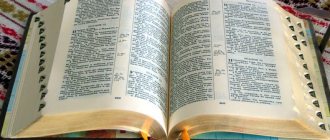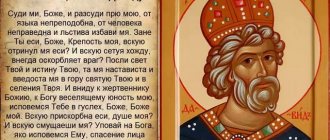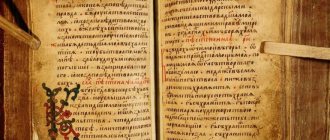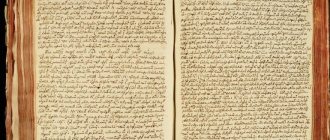Text of prayer Psalm 31
In Church Slavonic with accents
To convey the deep meaning, the text of Psalm 31, the prayers of believers to the Lord, is read in churches during services in Church Slavonic (Old Church Slavonic.
Psalm to David, Reason
1 Blessed, remaining illegally and covered in dreams.
2 Blessed is man; the Lord will not accuse him of sin; flattery is not in his mouth.
3 Like silent ones, my bones are promised, from my curls all day long
4 Like day and night, your hand is heavy on me, returned to passion when you anoint me with thorns.
5 My iniquity is known, and my sin is not covered, rech: we confess my iniquity before the Lord, and you have forsaken the iniquity of my heart.
6 For this, every monk will pray to you in good times: and in a flood of many waters they will not come close to him.
7 You are my refuge from the pain that has carried me away: my joy, save me from those who oppressed me.
8 I will enlighten you and insist on this path; when you leave, I will stop you before your eyes.
9 Do not be like a horse and a disorder, and do not be distracted: with the bridle and bridle of their cheeks you will overcome those who do not come near you.
10 Many wounds are the wounds of a sinner who trusts in the Lord to have mercy.
11 Rejoice in the Lord, rejoice in righteousness, rejoice in all righteousness in your heart.
In Russian
Communication with the Lord is not always possible for a believer during temple services. However, this does not mean that he is not allowed to address his prayer to God. In order for the words of Psalm 31 to reach the very essence of prayer, you can read it at home (alone) in Russian:
Psalm of David in teaching.
1 Blessed are those whose iniquities are forgiven and whose sins are covered!
2 Blessed is the man to whom the Lord does not impute sin and in whose spirit there is no deception!
3 While I was silent, my bones were worn out by my daily groaning,
4 Day and night your hand was heavy on me; my freshness disappeared, like in a summer drought.
5 But I revealed my sin to you and did not hide my iniquity; I said, “I confess my crimes to the Lord,” and you absolved me of my sin.
6 Therefore, every righteous person will pray to you at the right time, and then the sound of many waters will not reach him.
7 You are my cover: you protect me from pain, you surround me with the joys of liberation.
8 “I will instruct you, I will guide you in the way you should go; I will guide you, I am looking at you."
9 “Do not be like a horse, like a foolish mule, whose mouth must be yoked with bridles and bridles so that it will obey you.”
10 The tribulations of the wicked are many, but those who hope for mercy in the Lord.
11 Rejoice in the Lord, and rejoice, ye righteous; triumph of all the righteous in heart.
Text [edit]
King James Version[edit]
To the main musician - David's song.
- In You, OL ORD, I rely; Let me never be ashamed: deliver me by Thy righteousness.
- Bow down Your ear to me; deliver me quickly: be my strong rock, for a house of protection to save me.
- You are my rock and my fortress; Therefore, for Thy name's sake, lead me and lead me.
- Pull me out of the snare that they have secretly laid for me: for You are my strength.
- Into Thy hand I commit my spirit: Thou hast redeemed me, OLD God of truth.
- I hated those who respect false vanity, but believe in LORD.
- I will rejoice and rejoice in Thy mercy, for Thou hast thought of my misfortune; you have known my soul in adversity;
- And you did not put me in the hands of the enemy: you placed my feet in a large room.
- Have mercy on me, Lord, for I am in trouble: my eyes are consumed with grief, yea, my soul and my belly.
- For my life is lived in sorrow, and my years are spent in sighs: my strength fails through my iniquity, and my bones are worn out.
- I was a disgrace among all my enemies, but especially among my neighbors, and a fear among my acquaintances: those who saw me missing fled from me.
- I am forgotten like a dead man out of sight: I am like a broken vessel.
- For I heard slander from many: fear was on all sides: they took counsel together against me, but plotted to take my life.
- But I believed in you, PR ORD: I said: You are my God.
- My time is in your hand: deliver me from the hand of my enemies and from those who persecute me.
- Make your face shine upon your servant; save me for Your sake.
- Let me not be ashamed, OL ORD; for I have called you: let the wicked be put to shame, and let them be silent in the grave.
- Let lying lips be silent; who speak proudly and contemptuously of the righteous.
- Oh, how great is Your kindness, which You have stored up for those who fear You; which you have created for those who trust in you before the sons of men!
- You must hide them in the mystery of Your presence from human pride; you must keep them secret in the tent from the strife of tongues.
- Blessed be the LORD, for he has shown me his wonderful kindness in a strong city.
- For I said hastily: I am cut off before your eyes; nevertheless you hear the voice of my supplications when I cry to you.
- O love the LORD, all his saints: for the LORD protects the faithful and generously rewards the proud worker.
- Have courage and it will strengthen your heart, all of you who hope in the LORD.
History of writing
Psalm 32 is believed to have been written by David, who wrote it while in a state of extreme satisfaction at God's forgiveness of his sin of killing Uriah and marrying his widow, Beersheba.
Realizing the horror of the sin he had committed, David prayed and asked for forgiveness for his sins. The psalm is full of words of repentance and joy about the forgiveness received.
Music settings[edit]
Classic [edit]
Henry Isaac composed a setting of verses 15 and 16 "Illumina faciem tuam" for four-part choir, published in Choralis Constantinus
in 1550.
[26] Carlo Gesualdo composed a setting of these poems for a five-part choir (SATTB), published in his Sacrae cantiones
in 1603. [27]
Hans Leo Hassler composed a setting of the complete psalm in Latin for three four-part choirs, published in Sacrae Symphoniae
in 1598.
[28] In 1648, Johann Rosenmüller published a setting of the first six verses in Latin for two sopranos and two tenors. , two violins and continuo, in Kern-Sprüche
.
[29] In te Domine speravi (Johann Rosenmüller) Johann Krüger set a German rhymed version of "In dich hab ich gehoffet, Herr" for four-part choir with additional instruments, published in 1649. Heinrich Schütz set the same hymn in Becker's Psalter, SWV 128, published 1661. [30] He wrote a complete psalm in Latin for solo voice and instruments, published in Symphoniae sacrae
in 1629. [31]
Joseph Haydn, for three voices, recorded three verses from James Merrick's rhymed paraphrase in English of "Blessed is the name of the God of Jacob", which was first published in 1794 in the Improved Psalm
. [32] Felix Mendelssohn set Psalm 31 to a capella music in English using the King James Version. [33] Arthur Sullivan wrote the hymn for four voices and organ, setting the last two verses: "O Love the Lord", first published in 1864. [34]
Modern [edit]
Contemporary compositions that include verses from Psalm 31 include "Two Sacred Songs" (1964) for voice and piano by Robert Starer, [35] "In You, Lord, Do I Trust" (1964) by Jana Bender, [36] and "Blessed Are You Lord" (1973), introduction and hymn by Nancy Lupo. [37]
In the 21st century, Nobuaki Izawa set "Illumina faciem Tuam" as four parts into a canticle, published in 2016. [38] The Salisbury Bishop's Choir sang Psalm 31, with music written by Walter Alcock, Richard Shepard, and Charles Frederick South , for the 2012 entry. [39] The Psalms Project released their musical composition of Psalm 31 in the fourth volume of their album series in 2022. [40]
Interpretation
For the words of prayer to penetrate into the very heart of the person praying, it is necessary that he understands every verse of Psalm 31. This requires line-by-line interpretation:
The inscription presented to the Psalm should be perceived as an instruction, a warning based on one's own experience.
- Verses 5-6 continue to discuss the suffering caused by sin and the relief the Lord gave him by removing the guilt of sin from him. The author points out that sin necessarily entails punishment.
- Verses 3-4: They tell of the moral agony of realizing the sinfulness of the act committed. The pangs of conscience are so strong that they led to physical exhaustion.
- Verse 7: Prayer illuminates the sinner's soul and fills it with joy.
- Verses 8-9: The words are spoken in the name of God, who advises us not to become stubborn horses and donkeys who understand only the whip. It is important to realize the disasters sent by the Lord, the scourge that should admonish the stubborn and direct them to the path of repentance.
- Verses 1-2: They contain thoughts of complete moral cleansing, when justification is required not in a legal sense, but in a spiritual sense, since moral torment for sins is more painful than punishment under the law.
- Verses 10-11: “Only believers can count on God’s mercy, joy and protection. Many tribulations and trials await the wicked.
Links[edit]
- Mazor 2011, p. 589.
- ↑
Parallel Latin/English Psalter/Psalmus 30 (31) Archived October 10, 2016 at the Wayback Machine Medievalist.net - ^ ab Abramowitz, Rabbi Jack. "It's not paranoia if they really want to get you." Orthodox Union
. Retrieved February 3, 2022. - Henry, Matthew (2020). "Psalm 31". Bible Study Tools
. Retrieved February 3, 2022. - Jump up
↑ Briggs & Briggs 1960, p. 264. - ↑
Lisa M. Wolf (November 1, 2011). Ruth, Esther, Song of Songs and Judith. Wipf and Stock Publishers. paragraph 60. ISBN 978-1-60608-520-2. ... Persian period, beginning in 539, King Cyrus of Persia conquered ancient Babylonia. - F. Charles Fensham (24 February 1983). Books of Ezra and Nehemiah. Wm. B. Eerdmans Publishing. clause 7. ISBN 978-0-8028-2527-8. Nehemiah arrived in Jerusalem in 445 as ruler of Judah...
- Wengert 2022, pp. 120-1.
- "Psalm 31 Bible Commentary: The Treasury of David by Charles H. Spurgeon". Christianity.com
. 2022. Retrieved February 3, 2022. - Limburg, James (2020). "Commentary on Psalm 32:1-5, 15-16". Luther Seminary. Retrieved February 3, 2022.
- Scherman 2003, p. 264.
- Scherman 2003, p. 292.
- ^ a b c d Brauner, Reuven (2013). "Shimush Pesukim: A Complete Index to the Liturgical and Ceremonial Uses of Biblical Verses and Passages" (PDF) (2nd ed.). paragraph 36. Retrieved February 3, 2022.
- https://www.sefaria.org.il/Siddur_Ashkenaz%2C_Shabbat%2C_Maariv%2C_Adon_Olam?lang=bi
- Jump up
↑ Goldberg & Rayner 2012, p. 312. - Guzik, David (2019). "Psalm 31 - Shelter from Trouble in the Secret Place of God's Presence". The indestructible word
. Retrieved February 3, 2022. - Kirkpatrick, A. F. (1901). The Book of Psalms: With Introduction and Notes. Cambridge Bible for Schools and Colleges. Book IV and V: Psalms XC-CL. Cambridge: University Press. item 838. Retrieved February 28, 2022.
- https://www.ccel.org/ccel/spurgeon/sermons45.xlii.html
- Illumina faciem tuam: free scores in the choral public library (ChoralWiki)
- "In dich hab 'ich gehoffet, Herr". gymnary.org. Retrieved January 11, 2022.
- “In You, Lord, I trust.” gymnary.org. Retrieved January 18, 2022.
- "My times are in your hands". gymnary.org. Retrieved February 7, 2022.
- Spurgeon, Charles Haddon (17 May 1891). "My times are in your hands." biblebb.com
. Retrieved February 7, 2022. - Käßmann, Margot (18 April 2013). "Wir Weltverbesserer". Die Zeit
(in German). Retrieved February 7, 2022. - "Night Prayer (Compline)". Anglican Church
. Retrieved May 28, 2022. - Illumina faciem (Henry Isaac): Free scores at the Choral Public Library (ChoralWiki)
- Illumina faciem tuam (Carlo Gesualdo): Free scores in the Choral Public Library (ChoralWiki)
- In te Domine speravi a 12 (Hans Leo Hassler): free scores in the Choral Public Library (ChoralWiki)
- In te Domine speravi (Johann Rosenmüller): Free scores in the Choral Public Library (ChoralWiki)
- ↑
In dich hab ich gehoffet, Herr: Free scores in the Choral Public Library (ChoralWiki) - In te, Domine, speravi, SWV 259 (Heinrich Schütz): free scores at the Choral Public Library (ChoralWiki)
- Blessed is the name of the God of Jacob (Joseph Haydn): Free ratings on the Public Domain Choral Library (ChoralWiki)
- Reichwald (2008) Siegwart. Bloomington, Indiana Mendelsohn at Performance
Indiana University Press. paragraph 234. - ↑
O Love the Lord (Arthur Sullivan): free scores at the Choral Public Library (ChoralWiki) - Library of Congress 1967, p. 1842
- Library of Congress 1967, p. 1519.
- Library of Congress 1975, p. 2517.
- Illumina faciem tuam (Nobuaki Izawa): free scores at the Choral Public Library (ChoralWiki)
- "The Complete Psalms of David, Series 2, Volume 2: Psalms 20-36". AllMusic
. 2022. Retrieved February 8, 2022. - "New Album Available Now". Psalter. Retrieved February 8, 2022.
Bibliography[edit]
- Charles Augustus Briggs; Emily Grace Briggs (1960) [1906]. A critical and exegetical commentary on the book of psalms. International critical commentary. 1
. Edinburgh: T&T Clark. - Library of Congress (1967). Copyright Catalog: Third Series/Music: July-December 1964. US Government Printing Office.
- Library of Congress (1975). Copyright Catalog: Third Series/Music: July-December 1973. US Government Printing Office.
- Goldberg, David J.; Rayner, John D. (2012). The Jewish People: Their History and Their Religion. Faber & Faber. ISBN 9780571288359.
- Mazor, Leah (2011). Berlin, Adele; Grossman, Maxine (ed.). Book of Psalms. Oxford Dictionary of Jewish Religion
. Oxford University Press. ISBN 978-0-19-973004-9. - Sherman, Rabbi Nosson (2003). The Complete Artscroll Siddur (3rd ed.). Published by Mesorah Publications, Ltd. ISBN 9780899066509.
- Wengert, Timothy J. (2019). The Word of Life: An Introduction to Lutheran Hermeneutics. Fortress Press.




